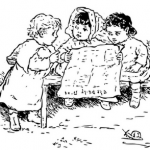 I came across this excerpt recently and it moved me. It’s from Philip Simmon’s book called “Learning to Fall”, and it is written from his perspective as a 35 year old husband, father and teacher diagnosed with a neuromuscular disease which killed him a few years later.
I came across this excerpt recently and it moved me. It’s from Philip Simmon’s book called “Learning to Fall”, and it is written from his perspective as a 35 year old husband, father and teacher diagnosed with a neuromuscular disease which killed him a few years later.“My earliest memory: I’m standing alone at the top of the stairs, looking down, scared. I call for my mother, but she doesn’t come. I grip the banister and look down: I have never done this on my own before. It’s the first conscious decision of my life. On some level I must know that by doing this I’m becoming something new: I am becoming an “I.” The memory ends here: my hand gripping the rail above my head, one foot launched into space.
Forty years later, encroaching baldness has made it easier to see the scars I gained from that adventure. Still, I don’t regret it. One has to start somewhere. Is not falling, as much as climbing, our birth right? In the Christian theology of the fall, we all suffer the fall from grace, the fall from our primordial connectedness with God. My little tumble down the stairs was my own expulsion from the Garden: ever after I have been falling forward and down into the scarred years of conscious life, falling into the knowledge of pain, grief, and loss.
We have all suffered, and will suffer, our own falls. The fall from youthful ideals, the waning of physical strength, the failure of a cherished hope, the loss of our near and dear, the fall into injury or sickness, and late or soon, the fall to our certain ends. We have no choice but to fall, and little say as to the time or the means.
……
Think again of falling as a figure of speech. We fall on our faces, we fall for a joke, we fall for someone, we fall in love. In each of these falls, what do we fall away from? We fall from ego, we fall from our carefully constructed identities, our reputations, our precious selves. We fall from ambition, we fall from grasping, we fall, at least temporarily, from reason. And what do we fall into? We fall into passion, into terror, into unreasoning joy. We fall into humility, into compassion, into emptiness, into oneness with forces larger than ourselves, into oneness with others whom we realize are likewise falling. We fall, at last, into the presence of the sacred, into godliness, into mystery, into our better, diviner natures.”















